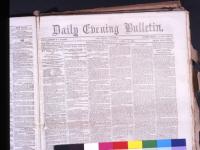Like his modern counterparts, Abraham Lincoln’s political success depended greatly on his relationship with the press. While the term “mass media” today encompasses a variety of traditional and electronic formats, Lincoln dealt with only one: newspapers. Maintaining a positive relationship, however, was not simple. Not only were there a greater number of newspapers in the North than exist today, many of these newspapers gave little pretense to “objective” journalism. During the 19th century, many newspapers were party organs, with their editor often striving for political office or seeking to play the role of “kingmaker” in party politics.
Philadelphia’s seven major daily newspapers were no different. The Evening Journal was the lone Democratic organ in sea of Republican-influenced newspapers. The Inquirer, which carried the largest circulation in the city at 60,000, was published by Jesper Harding, whose son George, a lawyer, knew both Lincoln and Secretary of War Edwin Stanton during the 1850s. When Harding was appointed collector of Internal Revenue in Philadelphia by Lincoln, his other son, William, took over the paper, which was clear in its support for the Lincoln administration.
Another major Philadelphia newspaper, the Bulletin, was an anti-slavery paper with close ties to Simon Cameron, Lincoln’s first Secretary of War. In fact, as the federal government shut down many newspapers for their editorial content, the Inquirer and the Bulletin openly supported these actions.
The partisan nature of these newspapers created a unique challenge for Lincoln at the outset of the War. Many of the Democratic editors were openly hostile towards the Lincoln administration and the conduct of the war and created a clearly adversarial editorial tone that some supporters of the president felt bordered on treason. While Lincoln supported the constitutional rights of a free press, he also recognized that such opposition from the newspapers was damaging to the war effort.
In a controversial series of steps, many opposition newspapers, including two in Philadelphia, were ordered suppressed by the federal government for providing “aid and comfort” to the enemy. The “aid and comfort” found in many offending newspapers often did not take the form of government secrets or military intelligence. Instead, the editorial opinions expressed by these newspapers were enough to draw the attention and ire of the federal government. The cases of the Christian Observer and the Evening Journal vividly illustrate the often fine line between constitutional freedoms provided to the press and security concerns.

